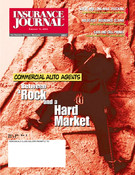Harvey Rosenfield’s California-based Foundation for Taxpayers and Consumer Rights (FTCR) filed separate lawsuits on Jan. 9 against three major auto insurers, Geico Corp., SAFECO Corp., and the Automobile Club of Southern California. The suits contain allegations the companies violated Proposition 103 by determining premium rates in a manner not in accordance with the California Department of Insurance (CDI).
Specifically, FTCR contends in part that the companies are violating Prop. 103 by using a consumer’s lack of prior insurance as a factor in determining premiums, which are quoted higher for those consumers than for others who had prior insurance coverage.
FTCR further maintains that the companies concealed this violation of the California Insurance Code Section 1861.02(a), (b), and (c) by passing off the increase as a surcharge. It is alleged that through these actions, the insurers are disqualifying safe drivers who would have otherwise been eligible for sertain discounts.
Pam Pressley, a staff attorney for the FTCR, said that these practices penalize all drivers, as insured motorists will have to pay more for uninsured motorist coverage because people are unable to afford insurance. She added that the charges stemmed from numerous consumer complaints, which were then verified by some agents.
For some insurance industry experts, however, it really all boils down to persistency, which recognizes customers who have been with the same insurance company for a number of years and maintain good driving records, by rewarding them with lower premiums, known as the “Good Driver Discount.”
Some experts maintain that if successful the FTCR’s suit would punish law-abiding citizens who have been good drivers for many years by insisting on charging all customers with good driving records, regardless of prior or no coverage, the same rates. They also feel that all consumers have the right to shop around for automobile insurance, a practice that they feel the FTCR is trying to impede.
Sam Sorich, vice president and West regional manager of the National Association of Independent Insurers (NAII), offered a different perspective. In December of 2001, the CDI submitted proposals for two new amendments to California Code of Regulations, Title 10, Chapter 5, Subchapter 4.7, entitled “Rating Factors.”
According to Sorich, the proposals generated from the controversy over how the regulation determining rating factors should be implemented, as well as how the persistency factor should be implemented.
The existing regulation simply states that persistency can be used as an optional ratio for determining insurance rates. As stated in the proposal: “The Commissioner has determined that insurers have adopted differing interpretations of the meaning of persistency as an optional rating factor. Some insurers have interpreted persistency to mean the length of time a consumer has continuously maintained automobile insurance exclusively with that insurer. Other insurers have defined persistency more broadly to include coverage by different insurers, so long as there was not a lapse in coverage. Some of these insurers may have impermissibly required consumers to provide evidence of prior insurance to show that the consumer was ‘persistently’ covered by one insurer or another over time.”
Based on these findings, the Commissioner proposed regulation 2632.5 (d) (11) to define persistency, eliminating the difference of opinion on the controversial topic.
The second proposal deals with the setting of a proper and uniform method of driver record verification.
Currently, Insurance Code 1861.02(a) states that rates must be based on a policyholder’s driving record. The new proposal seeks to prohibit the use of such information with regard to insurance requirements on new applicants.
Additionally, the proposal would require—rather than applicant provision of written documentation from past insurers—that a company accept an applicant’s own assertion with regard to prior driving experience unless the company can come up with evidence to the contrary.
As Sorich explained, “the regulation is intended to prevent violations of the mandate so that insurers cannot use the absence of prior insurance as a factor for insurability or insurance rates.”
Topics Lawsuits California Carriers Legislation Auto
Was this article valuable?
Here are more articles you may enjoy.


 Married Insurance Brokers Indicted for Allegedly Running $750K Fraud Scheme
Married Insurance Brokers Indicted for Allegedly Running $750K Fraud Scheme  Winter Storm Fern to Cause Up to $6.7B in Insured Losses
Winter Storm Fern to Cause Up to $6.7B in Insured Losses  Zurich Insurance’s Beazley Bid Sets the Stage for More Insurance Deals
Zurich Insurance’s Beazley Bid Sets the Stage for More Insurance Deals  Allstate Doubles Q4 Net Income While Auto Underwriting Income Triples
Allstate Doubles Q4 Net Income While Auto Underwriting Income Triples 


